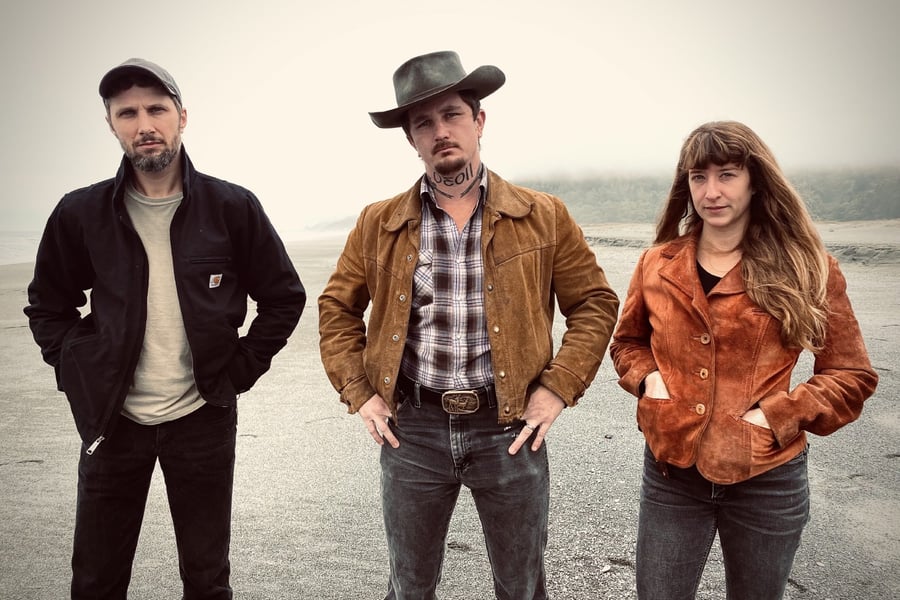Benjamin Tod’s Lost Dog Street Band was born out of freedom: the idea that an artist with a guitar can go anywhere, at anytime, and earn a living singing their songs. When the Tennessee songwriter was just 13, Tod began playing music for tips on the sidewalks of Nashville. It was an education in resourcefulness, hard knocks, and staking one’s claim.
“We woke up under a bridge and crawled out, set up on a street corner all day long and held down the spot. If one person needed to pee, someone had to wait there,” Tod says.
But today’s busking community is being squeezed. While Tod and Ashley Mae, his wife and creative partner in Lost Dog Street Band, eventually went from holding court on Nashville’s Lower Broadway to headlining venues like the city’s Cannery Ballroom, their busking peers are finding few places to open their cases and play.
“Going around the country right after Covid last summer, I really saw the impact that it had on busking communities and street culture in general. I think Covid was kind of an opportunity for the ruling class to initiate policies that further disenfranchised people away from the downtown area and the public spaces,” Tod says, citing busking hot spots that have since cooled. “Asheville, Seattle, Charlottesville, Boulder’s Pearl Street Mall, Burlington, Vermont…everywhere that I’ve been to, busking seems to be dead.”
The busking spirit is very much alive, though, on Glory, Lost Dog Street Band’s new album. Tod, fiddle player Mae, and bassist Jeff Loops revisit their sidewalk beginnings over 10 acoustic songs. There’s no slick production, no radio-ready flair — just honest, urgent songs that can be strummed as readily on the curb as in a club.
“Fighting Like Hell to Be Free” has elements of bluegrass (Tod and Mae now make Kentucky their home), “Losing Again” is a heartbreaking country ballad akin to Hank Williams’ “You Win Again,” and “What Keeps Me Up Now” is a recovering addict’s admission that the sober life can be a terrifying one. Tod burned through more than a decade in the throes of drug and alcohol dependency before finally cleaning up.
“I spent the earlier part of my career at the dead very bottom: waking up under a bridge or in a van, crawling over to a street corner to busk, and essentially being living art in America for the majority of my youth. And there’s a lot of opportunities that I missed because of that stubbornness,” he says. “I had so much integrity invested, whether it was legitimate or whether it was a delusion — which is hard for me to separate at this point because I was so far gone with drugs and alcohol. I feel like I’ve wasted a lot of my best releases, best songs, and years of my life because of that stubbornness.”
Love Music?
Get your daily dose of everything happening in Australian/New Zealand music and globally.
Tod sums up that tortured artist’s journey in Glory’s opening track, “Until I Recoup (Glory 1),” a defiant promise to persevere until he breaks even. “They say it ain’t easy and I know that’s the truth/that hard living crown looks foolish on you,” he sings. “I ain’t leaving until I recoup/the glory I pissed away in my youth.”
At just 31, Tod is by no means old. But he can come across as carrying the chip of an 80-year-old man upon his shoulder. He describes himself as “disagreeable.”
“Living on the streets, it really threw me into a type of psychosis and addiction and desperation and violence that shaped me into a very skeptical person,” he says, “which I think is an extreme advantage in life as opposed to someone that comes in and gets everything handed to them. They don’t have any real understanding of what it would take to do this the hard way.”
It’s Tod’s us-against-the-world point-of-view, and his fiercely DIY and independent approach to the music business, that has earned Lost Dog Street Band their circle of hardcore fans. “Sometimes that band is the only thing that keeps me going,” reads one fan’s tweet about the group.
Tod — who’s self-released all seven of the band’s albums on Anti-Corp Music, the label he runs with manager Dan Emery — says he’s simply creating something that’s flesh and blood in an artificial world.
“The large demographic of people that I speak to are the underdogs in this world,” Tod says. “There is a growing hunger for authenticity as we become a more plastic society and people hunger for anything that is real.”
To Tod, the experiences he accrued busking and hopping trains across the country (“I’m an experienced tramp,” he says) ground him in reality. Even if his idea of what it means to be free is constantly changing.
“Freedom used to be me, my guitar, and my pack under a bridge watching the train yard at night, chain-smoking cigarettes and drinking liquor,” he says. “Now, freedom is competence. Freedom is responsibility.”
From Rolling Stone US




































